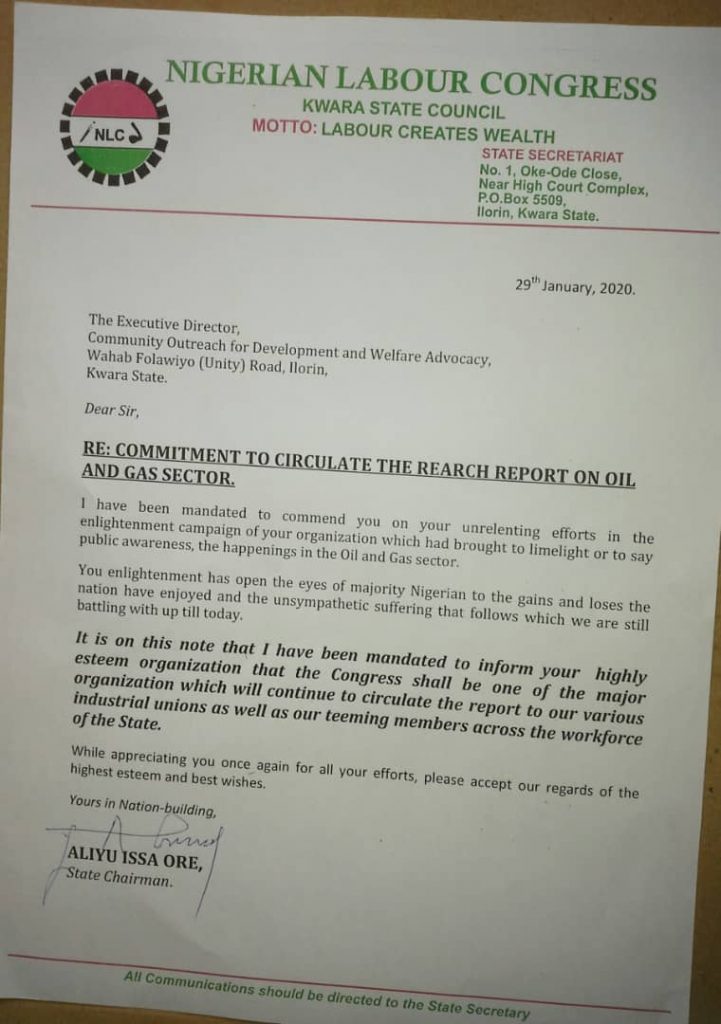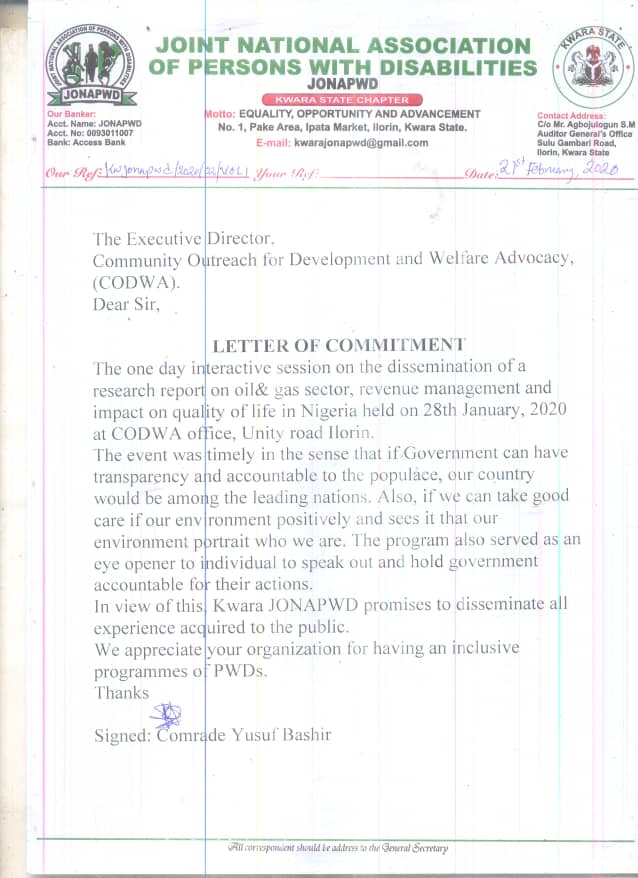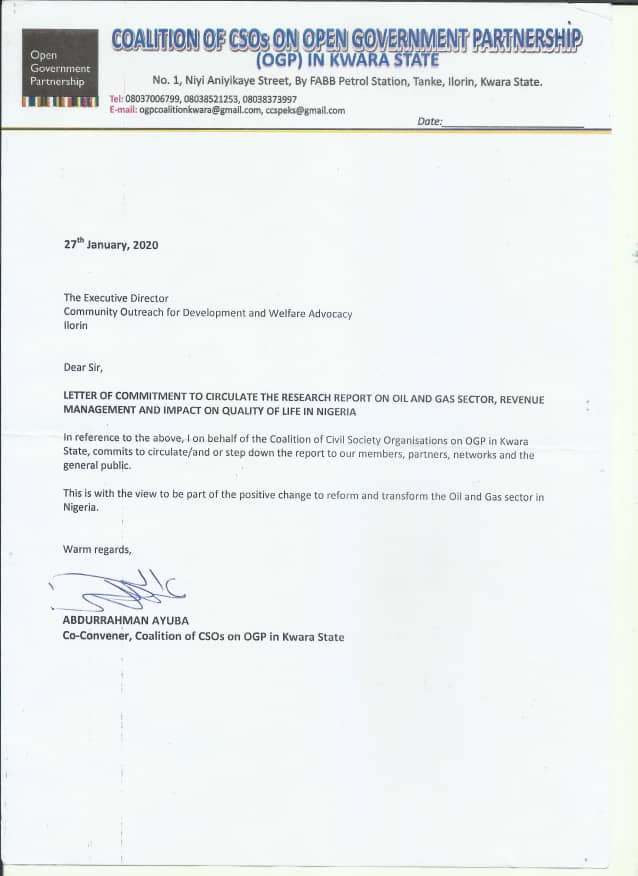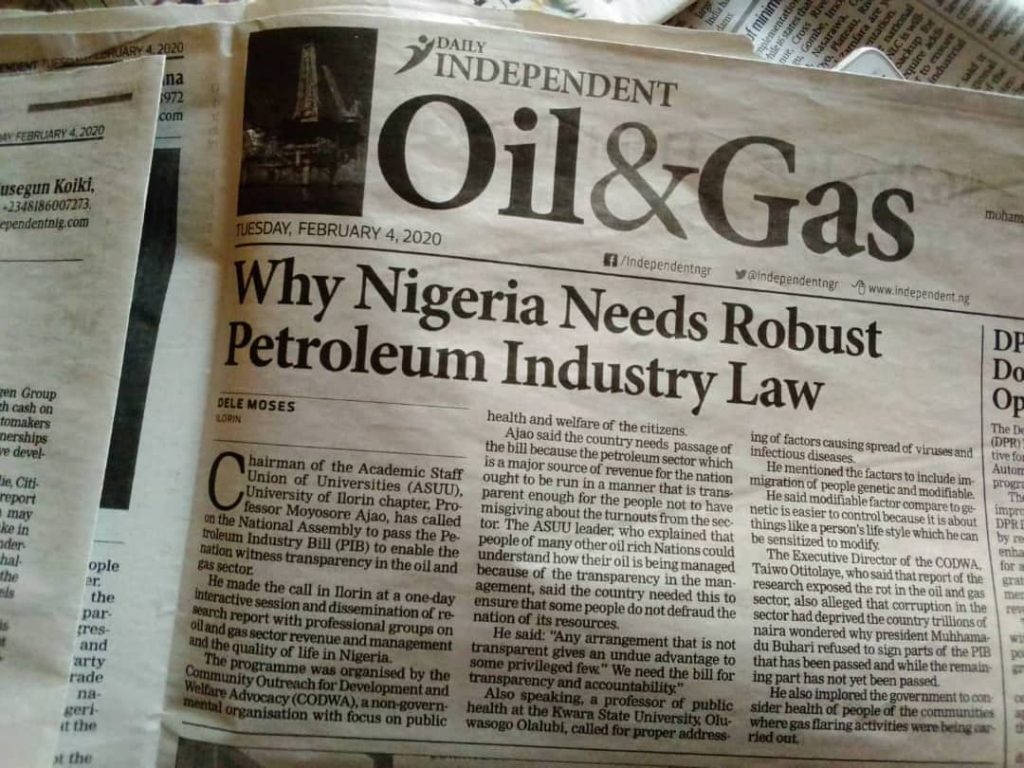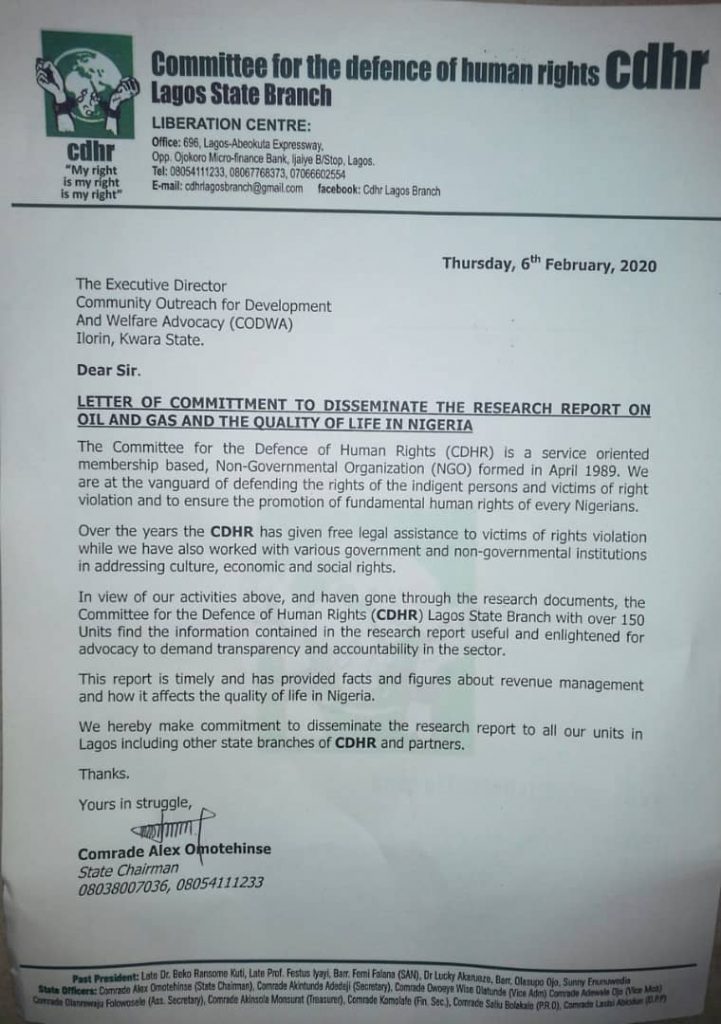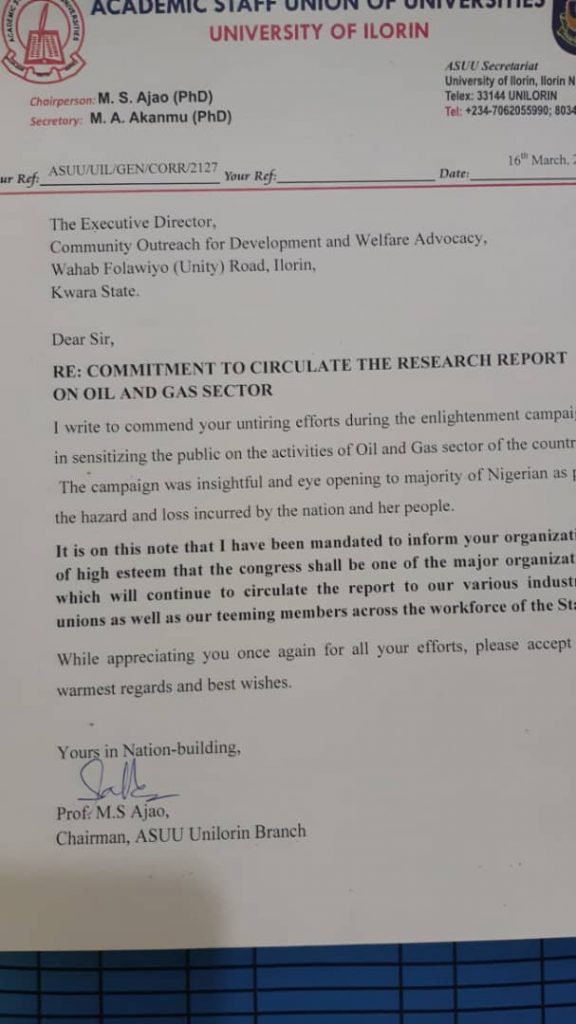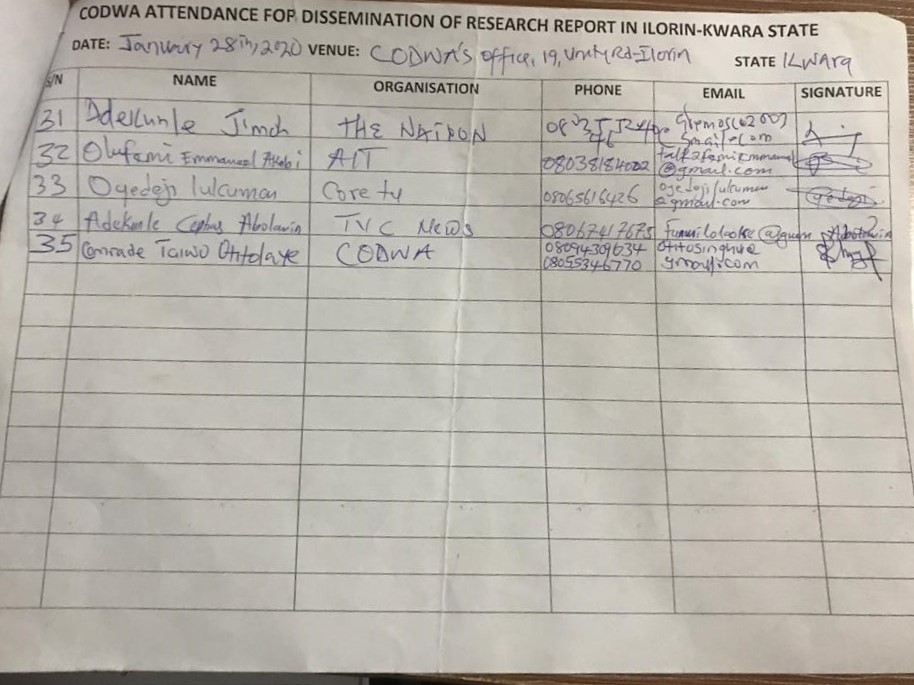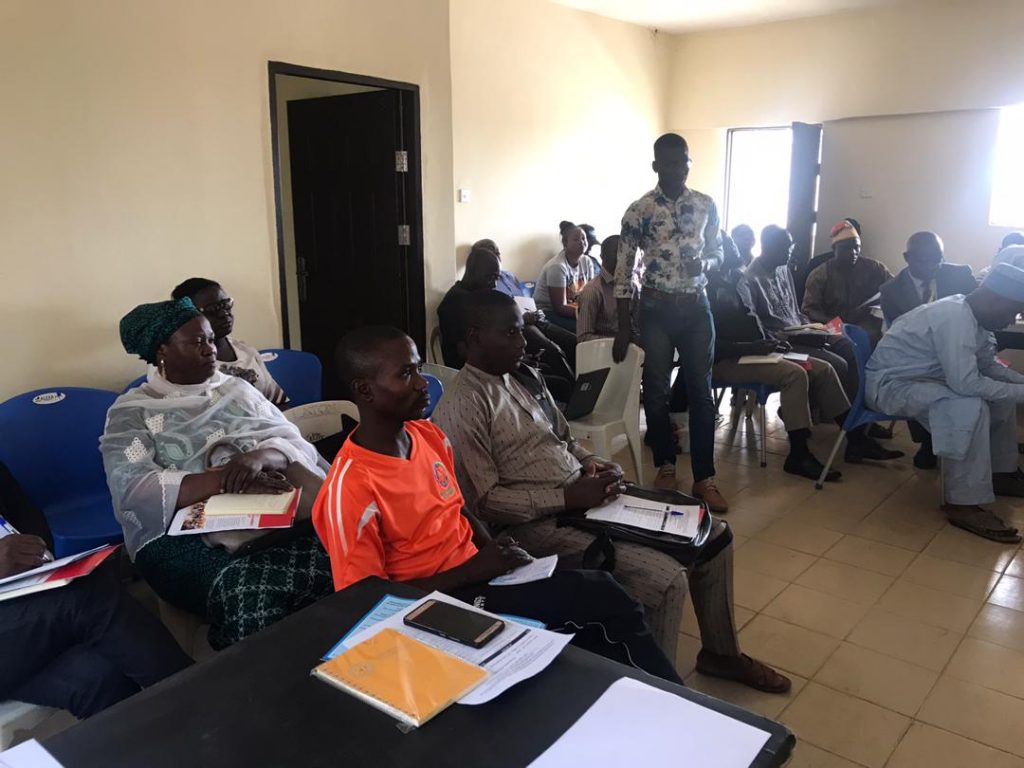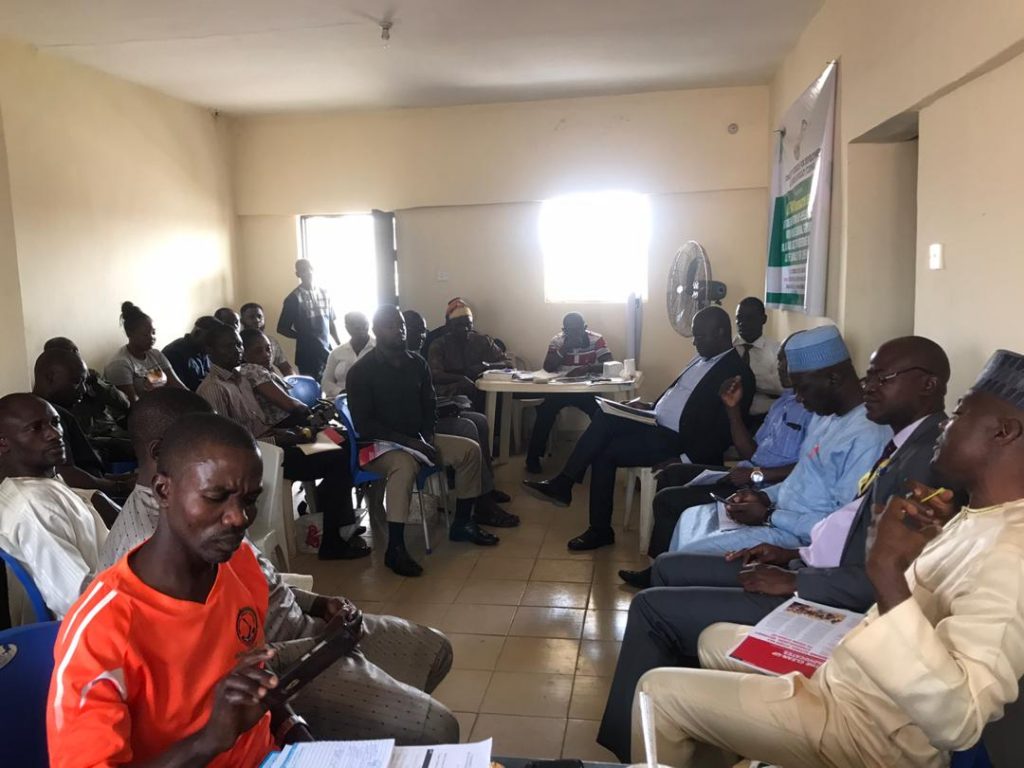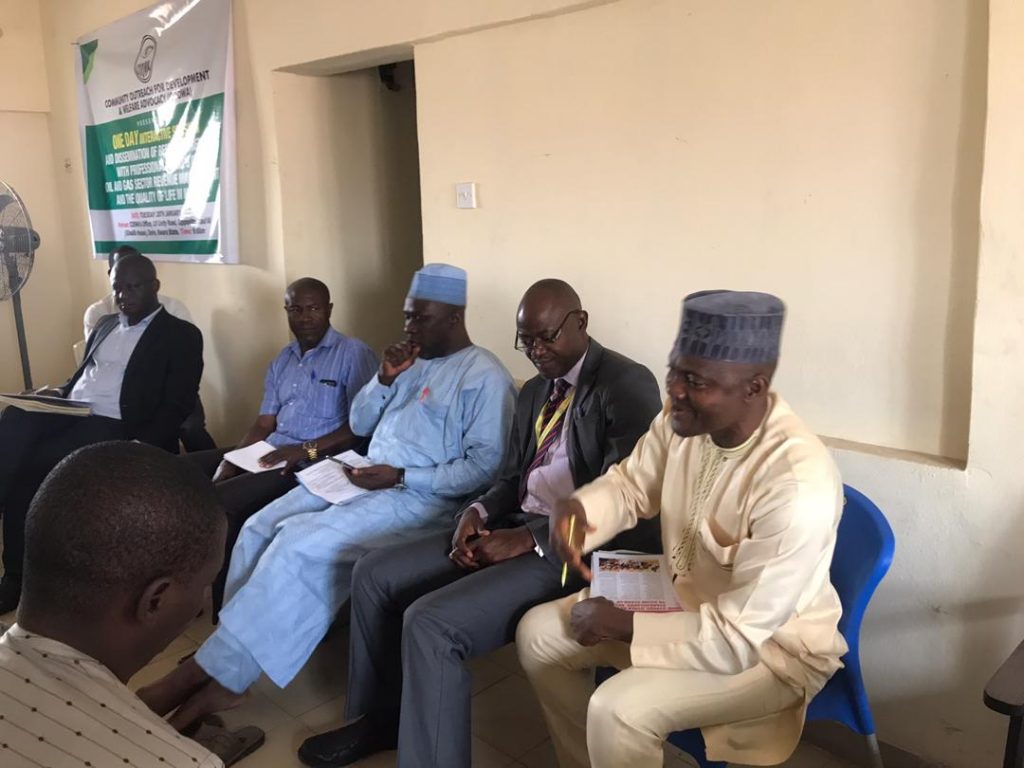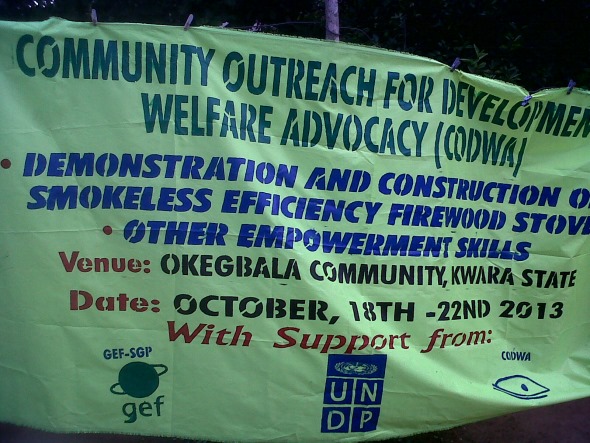The Community Outreach for Development and Welfare Advocacy (CODWA)
1. Leadership of 25 professional groups (Media, NMA, NBA, ASUU, ICAN, ASUP, etc
Location: Ilorin, Nigeria.
2. Social movements (human rights, NGOs, CBOs, CDAs, CAGs
Location: Lagos, Nigeria.
OUTCOMES/DELIVERABLES
Awareness and increased knowledge on the mismanagement of oil and gas revenue in Nigeria and the explicit impact on the quality of life in Nigeria
Participants to circulate the report findings to their national bodies, partners, contacts etc
Report and figures are cited in similar researches, academic works and conferences
Commitment from at least 5 participants to conduct step-down trainings on the findings of the study
Participated networks, coalitions, CBOs etc to disseminate the findings of the report on their platforms
Timeline for both events is Two (2) Weeks
EXECUTIVE SUMMARY
The interactive and dissemination sessions (step down) of the research report were held in Ilorin and Lagos. The duration for each activity was a day.
The target audiences were leadership of professional groups and social movements. The meeting exposed the high level of corruption, theft and mismanagement of oil and gas revenue to participants. They had better understand of the relationship between poor resource (oil and gas) management and the abject poverty and low quality of life in Nigeria. Equally, the interactions unveiled some of the reasons for system failure in Nigeria; some of these malfunctions are conspicuous in all sectors; education, (poor facilities in our schools), hospitals, roads, electricity, economy, and other areas including the ecosystem. Participants agreed that the recurring theft for over five decades, mismanagement of the sector have left is a national calamity ranging from revenue losses, environmental effects and climate change. These effects have national coverage, and not limited to the Niger Delta region. Therefore, they were more determined than before to support reforms and transformation of the oil and gas sector in Nigeria. The meetings stimulated interests and commitments from the groups to disseminate, step down and circulate the research report to their members, branches across the country; and with the wider public.
INTRODUCTION
The Community Outreach for Development and Welfare Advocacy (CODWA) carried out a dissemination and sensitization campaign in Kwara and Lagos states; situating it within her transparency and accountability program in the extractive sector with diverse groups. These clusters includes, professional associations, academia, NGOs, CBOs, FBOs, CAGs, CDAs, political parties, labour centres, women groups, persons with disability, social movements, media, research institutions, government ministries, departments and agencies, political parties and student bodies. In all, over seventy organizations participated.
The interactive and dissemination meeting was organized by CODWA, in collaboration with the Facility for Oil Sector Transformation (FOSTER). CODWA is a non-governmental, and not for profit organisation working within the grassroots communities and an advocate of human rights.
The objective was to expose the high level of corruption in the oil and gas industry through dissemination of research findings to professionals and advocacy groups who are expected to step down the outcomes from the meeting to the grassroot level in order to engage and challenge the government for a reform.
The first meeting was held on the 28th January, 2020 at CODWA’s office, Unity Road, Ilorin; while the second one took place at L’ Eola hotel, Maryland-Lagos on the February 5th, 2020. The two meetings were facilitated by Comrade Taiwo Otitolaye, the Executive Director of CODWA with support from the FOSTER team. It included paper presentations on ‘’oil and gas sector revenue management and quality of life in Nigeria’’ and ‘’corruption & quality of life’’.
HIGHLIGHT FROM THE ILORIN MEETING
WELCOME REMARKS
Comrade Taiwo Otitolaye welcomed everyone to the meeting and gave a brief insight to the report. He noted that the research was carried out in 2017 to study how revenue management in the Nigeria oil and gas sector affects the citizens when considered from a socio-economic perspective.
CODWA’s Executive Director mentioned that the research report cited NNRC’s information which affirmed that Nigeria lost about N3.8 trillion to oil theft in 2016 and 2017 and in comparison, the combined allocation for health and education in the two years was N189.4 billion. This translates to a mere 8.4% of the estimated value of losses from oil theft in the two years.
He stated that currently, the Nigeria education system is poorly funded and this is the reason ASUU continues to advocate for adequate funding of the education system. The need for circulating the report is to ensure that participants who represent different organizations are aware of the impacts of poor revenue mismanagement on socio-economy and relate it to how it affects them as individuals and as organizations.
He stimulated participants to make commitments to disseminate and circulate the report amongst their various networks so that it gets to the grassroots and citizens who will put pressure on government to do what is expected of them as policy makers.
There were presentations, panel sessions to discuss the impacts of revenue mismanagement on education, public finances, employment, environment and ICT, legal perspectives and nation building.
Two sets of questionnaires were prepared and administered by participants. CODWA’s questionnaire was administered online using COMMCARE application(questionnaire analysis is treated as separate a document). Participants were also asked to sign a commitment to step down the research report.
This narrative report summarizes the activities including presentations, highlights of panel sessions, as well as, the questions and answer sessions.
BACKGROUND
The Executive Director gave the background to the research report. He reiterated that several researches attest to the fact that Nigeria has the second-largest amount of proved crude oil reserves in Africa, the eight largest among OPEC countries, and the 10th largest in the world. She also has the 8th largest gas reserves in the world. According to the (World Bank, 2019), Nigeria, with a population of about 203 million persons is the largest oil producer in Africa and is one of the world’s top five exporters of Liquefied Natural Gas (LNG). Proved Reserves of Natural Gas in Nigeria was estimated to be 180 Trillion Cubic Feet (TCF) as at 2018
For over six decades, oil and gas has taken the centre state of Nigeria’s economy, relegating to the background agriculture which was the main stay under the Regional government of the 1963 Republican Constituted regions. As at today, the Nigeria’s population is estimated to be 203 million, with one of the largest economies in Africa. But this economy is still vastly reliant on crude oil. oil accounts for over 80% of foreign exchange earnings , and up to 66% of government revenue. However, it contributes less than 10% to Gross Domestic Products (GDP).
BASELINE MATERIAL FOR THE MEETING
The baseline material for CODWA’s education, promotion and mobilization of the key groups and the critical mass in Nigeria to support reforms and transformation in the sector is the result of a study done by two eminent scholars Professor Adeola Adenikinju of the department of Economics, and Centre for Petroleum, Energy and Economic Law of University of Ibadan and his counterpart; Professor Aderoju Oyefusi of the department of Economics, University of Benin..
TOP QUESTION TO RESOLVE AND INDICATORS
The top question of several decades that has become a recurring enigma is whether oil is a blessing or a curse to Nigeria?
To address this question, CODWA’s deductions was to juxtapose several factors including the research report, discussions from the two interactive sessions held in Lagos and Ilorin and realities of the quality of life in Nigeria. The two researchers of the oil and gas and the quality of life in Nigeria highlighted some major manifestations compared with global indicators.
The report opined that despite sixty years of oil exploration and production and massive inflow of rents occasioned by multiple periods of oil boom, Nigeria remains at the bottom in terms of development. Recent performance rankings place her among countries with low human development with HDI score that is lower than the averages for oil-exporting countries and Sub-Saharan Africa. In spite, of the huge revenues earned from oil exports, estimated at over USD1.5 trillion between 1960 and 2017, Nigeria is ranked the sixth most miserable country on the 2018 Hanke’s Misery Index, behind two other troubled and natural resource rich countries, Venezuela and Zimbabwe.
According to the research report, specific exemplar resultant failures is comparing Nigeria’s global ranking in the table
| Energy Resource Ownership | *Global Ranking | Energy Use | *Global Ranking | Economic Factors | **Global Ranking | Human Development and Social Factors | ***Global Ranking |
| Oil production | 13th | Oil consumption per capita | 99th | GDP per capita (PPP-US$) | 161st | Infant mortality rates | 215th |
| Oil reserves | 10th | Natural gas consumption per capita | 88th | GDP growth rate | 188th | Physician density | 130th |
| Oil export | 6th | Oil import | 124th | Population living below poverty | 165th | Hospital bed density | 176th |
| Natural gas reserves | 9th | Electricity consumption per capita | 186th | Inflation rate | 212th | Life expectancy at birth | 213th |
| Natural gas production | 17th | Industry production growth rate | 154th | Literacy rate | 144th | ||
| Natural gas export | 13th | Unemployment rate (age 15-24) | 135th | Health expenditure (% of GDP | 166 | ||
| Investment-GDP | 112th | Military expenditure (% of GDP) | 145th | ||||
| Maternal mortality rate (deaths/100,000 live births | 177th | ||||||
| Corruption perception index | 144th |
Note:. **Ranking ranges from 1 to 242, with lower ranks corresponding to better outcomes. ***Ranking is based on 242 countries globally for most of the indicators
Data source: Adenikinju, 2017
GLOBAL COMPARRISON OF OIL COUNTRY’s MINIMUM wage
The minimum monthly wage in a selected oil exporting country were compared and result showed that Nigeria has the lowest minimum monthly wage which is about $50.
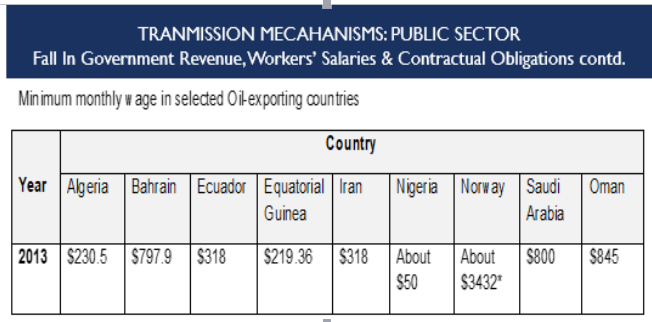
THE IMPLICATIONS FOR NIGERIA
Socio-Economic Implications
Corruption has not ceased because massive stealing and looting in the sector continue under President Muhammadu Buhari’s government.
While other major oil rich countries are diversifying, Nigeria is losing her earnings to official and unofficial theft instead of diversifying to othe sectors like agriculture, ICT, science and infrastructural development
Fuel subsidy as a known scam in the public domain in Nigeria is still in place and daily loses is put at N2 billion.
There are abject poverty, unexplainable misery in the midst of huge revenue from oil and gas
The practice of allocating oil wells to individuals is primitive, retrogressive and economic sabotage. Only in Nigeria is this primordial enrichment of the ruling class is being practiced
Delayed and unpaid salaries and wages
High rate of unemployment and under employment
Nigeria has become the world capital of poverty
Huge disparity between the rich and the poor
Increased crimes and social ills in the society
Decimated and collapsed education, high rate of out of school children
Public Health and Environmental Issues
More worrisome is that Nigeria continues to lag behind in energy transition while smaller African countries have joined the Energy transition’s global trend. She is still entangled in the euphoria of fossil fuels that is fast becoming obsolete and climate change risks.
Environmental degradation, pollution in the Niger Delta region
Contaminated water and farmlands (the benzyn level in Ogoni water is 900 times more than WHO recommendation)
Increased rate of infant and child mortality, and maternal mortality rates
Nigeria takes the lead in open defecation in the world what this means is that more citizens live in make-shift and slum houses
There are overcrowding in residential make-shif and slum areas
Increased disease, deaths and low life expectancy in Nigeria
The Ogoni case has become an international environmental disaster
Gaps in the legal framework of the oil and gas regime
MOU that has expired since the year 2000 is still governing some operations in the sector
Low political will to pass and assent to the Petroleum Industry Law; President Muhammadu Buhari refused to sign the version passed by the 8th National Assembly
The current Environmental Impact Assessment Act
The EIA Act does not cover human rights even for Post Impact Assessments (PIA)
The Environmental and Standards for Petroleum Industry in Nigeria (EGASPIN), also fall short of standards for global practices in the sector.
Security Implications
Security personnel acrossboard have been fingered to participate and aid oil bunkering
The activities of security personnel have triggered hostilities in the Niger Delta
Destruction of the environment have resulted to agitations
Oil and gas operators stimulate crisis in the region and connive with security to repress and kill citizens
Pipeline vandalisation has become a phenomenon in the region
The non diversification to create employment have encourage unemployed youth and persons to go into kidnapping and various crimes
PRESENTATION ON OIL AND GAS REVENUE MANAGEMENT AND QUALITY OF LIFE IN NIGERIA BY DR. TUBODENYEFA ZIBMA
Dr. Zimba mentioned that his presentation linksa different study with Comrade Taiwo’s presentation. The presentation looked at how oil and gas resourcesrevenue management affect and impact the quality of life in Nigeria. It also looked at value creation, commercial engagement practices, expectations management, specific dynamics of states captured practices,conflict entrepreneurs as instrument for the peculiar dynamicsaround government actions, policies and post community engagement and how they are used for government benefits.
Resource management encompasses the policies, norms, processes and institutions acountry uses to instrument, extract, convert and utilize its natural resources. It is the proper or improper use of natural resources and revenue arising from it. Nigeria has one of the largest oil reserves and the largest gas reserves in the world.
Evidence across the world shows thatthere is a connection between the nature of governance and politics to how well developed or developing countries use their natural resources especially crude oil, gold etc.The nature of politics playsa huge role on how government or elite converts resources into social goodfor its citizens. A responsible political governance system and elite will enhance its country’s development system and vice versa.
According to the Natural Resource Governance Institute and Resource Governance Index, there are 3 indices that is used to evaluate utilization of natural resource revenue. These indices are: value realization from natural resource; management of the revenue from natural resources and an enabling environment for carrying out businessto ensure that resources are transformed into social good and improves the quality of life,i.e improvement in emotional, physical, environmental, social and material well-being. These indices tellif a country or government manages its resources effectively.If a country scores higher across these indices, it means that such country has a functional resource management system in place.
When the resource governance indexof human development based on each of these broad categories is compared amongst oil producing countries, Norway was at the top of the scale. Norway is currently adjudged to be the best country in resource governance framework across the 3 categories, Nigeria sits in the middle.When open governance and legal framework were considered, Nigeria falls at the bottom. This shows that the nature of governance, accountability and transparency have a huge role to play in economic development.
Value Realization – underlying issues
Transparency and resource extraction; how transparent is the government?
Contacting and the licensing process: who gets the license, how and when, what are the details?
Environmental Impact Assessment disclosure
Environmental protection: the current environmental framework does not consider the emergence of anthropogenic issues associated with crude oil such as absence of refineries. There are more spills than what is being cleaned up and these have negative impact on livelihood and environmental sustainably.
Revenue disclosure egAgip has a platform in Balyesa state which flares about 6m cubic meter of gas daily but on report to the DPR, it is about 3.5m cubic meters.
Value sharing utilization; how much of gas and crude oildo we utilize as a country, is there enough refineries and are they operational?
Revenue management– underlying issues
Sub-national resource and revenue sharing – how is revenue shared amongst the various sections of the country?
Sovereign wealth fund (management and investment; Deposit and withdrawal)- how is the excess crude account managed?
National Budgeting
Fiscal rules
The enabling environment – underlying issues
Accountability – is there accountability in the sector?
Regulatory quality – is there an effective framework to control corruption in the oil and gas sector?
Political stability – how does the political stability affects production and utilization of resources?
A country’s performance across all the three indices shapes the quality of life of its citizens and this can be seen in the previous presentation where the minimum wage of Norway is about $3000 while Nigeria is $50. It shows that there is a transitionbetween how a country’s resources are managed and how it directly affects the quality of life.
He asked that in the context of translating oil and gas revenue into a good quality of life; is it solely the responsibilities of the national government, or state government or do communities and citizens owe the same responsibility to ensure revenue from natural resources are translated into social good that impacts positively on living standard and quality of life?
He noted that in a study on corruption and conflict in oil and gas investment carried out in 2018, this appears to be the case.Citizens owe themselves the responsibility and where citizens have failed to task government, there have been lost opportunities to improve the living standard through job creations that would have come from government’s investments.
He mentioned that government investments have failed as a result of poorimplementation e.g. The Ogidigbemgas project was supposed to provide thousands of jobs, building of a deep-seaports and creates 5,000 living apartments if there has been consideration fora co-locatedindustry that will produce petrochemicals and fertilizers and the project would have had a power generating plant enough to feed all these investments. The project and other government failed projects would have contributed to income and improve standard of living.
Another reason for these failures is because there was a structure at the national level that intended for the projects to fail and the structure succeeded because some key actors at the local communities also wanted the project to fail as the projects did not service their private interest.
There are three important key findings from the study;
Failed or failing value-creation policies and investments projectsintended to improve government revenues and ensures government have enough revenue to put back into social improvement.
Exploiting the absence of effective social engagement and expectations management frameworks. Citizens had no idea what project the government was embarking or the benefits accruable from it or the nature of what they should expect from the project.
Local instrumentation of property rights and benefit grabbing: although, legislation often determines property rights, there are local tenure system and landownership history despite the overarching federal legislation, which are used for benefit grabbing.
The reality is that:
public perception on resource revenue is seen as being used for the benefit of the government.
locals occupy inferior positions in the extraction process,
absence of revenue streams dedicated to local community development and
imbalance in the cost benefit allocation from extractive process.Where regulatory frameworks are inadequate, the cost of extraction on the citizens and public is more than the benefits derived from the extraction.
Local-level dynamics that support state capture network expansion
at the local level, the emergence of community leaders who have transited into national representatives with access to investment details use these to shape local level support or challenge to planned resource investments.
There is a value chain of conflicts embedded into local community governance structure through the use of ethno-cultural groups, youth groups/bodies or women groups. Informal politics also link up with state level relations and it effectively impede the utilization of resources or the creation of value for natural resources.
The level where state capture network strive, corporation and alliances are flexible and volatile.
He mentioned that all of these points to the fact that citizens owe themselves the same responsibility as they owe the government.At the micro level, everyone is part of the structure and collectively it is possible to demand for accountability which can also be used as a pedestal to demand for accountability at the state and national level.
He concluded that citizens can demand for accountability and begin to grow a framework that will force government to be responsible to its mandate. The state exists to ensure that citizens are provided with security, development and have opportunities to live a good life. If the state has failed to do that, citizens have the right to call government to task. The question however is,as citizens what are our responsibilities, what can we do and how do we go about solving these issues?
In both meetings, there were panel sessions to discuss the impacts of revenue mismanagement on education, public finances, employment, environment and ICT, legal perspectives and nation building.
This narrative report summarizes the activities including presentations, highlights of panel sessions, as well as, the questions and answer sessions.
PANEL SESSION
MODERATOR:Comrade Taiwo Otitolaye
PANELIST
Prof. Moyosore Ajao– Chairman of the Academic Staff Union of Universities (ASUU), University of Ilorin Chapter
Prof. OluwasogoOlaniji-H. O. D Public Health, Kwara State University
Mr. Edward Anisha– Director of Research and Curriculum development, Michael Imoudu National Institute for Labour Studies (MINILS), Ilorin
Comrade Umar-Chairman NUJ, Kwara Sate
Mr. Sunday– NLC Kwara state
The panel session was moderated by Comrade Taiwo Otitolaye. Panelists were asked to speak on: impacts of the findings of the report on Education, Public Finances, Employment, Environment and ICT, Legal Perspectives and Nation Building.
Prof. OluwasogoOlaniji (Head of the Department of Public Health, Kwara state University-Ilorin)
Noted that health and environment are interwoven and they are both the responsibilities of individuals. The WHO defined health as a complete state of mind i.e. socio-environment and mental factors must be in a perfect condition and not just merely absence of diseases or illness. By virtue of human activities in terms of mining, agriculture, environmental degradation etc. nature was altered and this led to the emergence of vectors reservoir and diseases. When the tripod of epidemiology is considered i.e. the environment, effectors agent and susceptible host, one needs to understand the relationship between the environment and the effectors’ agent. Environment could be physical, chemical and social, it is also a function of housing, income etc. How we control and manage our environment is critical to our wellbeing. There are contemporary health issues like LASSA, coronavirus that are currently being battled and there are lots of factors that can lead to the spread of diseases e.g. continuous movement of people across the borders. Population is a driver of diseases so also is ‘’risk factor’’. The‘’risk factor’’could be modified or non-modified risk factors. The non-modified risk factors are those that cannot be controlled and are natural e.g. age, gender, genetics. The modifiable risk factors are those that can be changed or altered e.g. alcoholism, multiple sex partners, high intake of carbohydrate, lack of exercise etc., all these are drivers of diseases.
Diseases are real and the environment is its spring board. The problem with Nigeria is the lack of sanction especially when it concerns the environment and health. There is need to adopt a holistic approach to take care of the environment and seeing it as our obligation to ensure its sustainability.
Prof Moyosore Ajao(Chairman, Academic Staff Union of Universities UNILORIN chapter)
noted that Nigeria was doing well on coal, groundnut, rubber etc. until oil was found in 1958 in Oloibiri and since then, there has been a shift in priorities from other sectors of the economy including the educational sector to oil and gas sector. Any country that has failed to invest in education should not think of the future because the next generational war will not be fought with armories but with intellects. Nigeria’s education system is poor and poorly funded that many parents would not take the chance to send their children to the kind of school they attended when they were young.
One of the problems for our failing education system is because many believe in pastors and Imams more than education. Religious beliefs and ethnicity have clouded many citizens rendering education a waste.
Another major issue is the political calculation of the country and the youths who have refused to be educated. Many go to school but eventually, they are not educated because the school did not pass through them. Education is necessary to give direction and give a better understanding into one’s future however, the entrepreneurship of that is not considered in Nigeria.He concluded that there is need to re-focusand redirect theNigeria education system.
Mr. Sunday: noted that majority believed that what labor stands for is to demand minimum wage from government. Labor cuts across all spheres of services and it is an advocate for the masses. He mentioned that
the presence of labor in the country is to fight government who oppresses its workers with policies that are unfavorable. Labor ensures that it counters such policies so as to make life meaningful to citizens.
Labor fights and demands for citizens’ rights.
Labor also fights for workers right and ensures that workers are taking care of in order to achieve optimum performance that will boost the economy of the nation.
Labor fights for minimum wage.
Labor today is not as radical as before because often times government uses their actions against the masses especially when they fight for minimum wage.
Delay in salary payment, discrimination in the amount paid as minimum wage (market tribalism) across the levels of government and government itself are some of the issues faced by labor. He noted that everyone needs to work together with labor to eliminate these disparities.
Comrade Umar: (Chairman, Nigerian Union of Journalists-Kwara state)
He noted that much needs to been done in terms of advocacy, education and attitudinal change for Nigeria to experience a change in its system and the media has a critical role to play in this regard. He noted that the amount of information presented in the report on the impact of oil and gas on the health and environment requires that more advocacy should be done at all levels of government.
He mentioned that other speakers have discussed about health and the environment but how much information is available on the contemporary health issues and
what is the state of our public health care?
what are the impacts of oil and gas on facilities, infrastructures? are citizens speaking out on these issues?
On education, he mentioned that for any country that wants to develop, education is the bedrock and educationists need to speak out on issues that affect the education system.
On environment, he mentioned that there is no way oil and gas will be mentioned and the environment will not be mentioned. There is so much that revolves around the environment as other factors depends on it for sustainability and thus the environment should be considered as an important factor in economic and human development.
He advised that citizens should be careful of news that are not genuine as they do more damage than good. He also advised that citizens should do lots of facts checking on information received. He encouraged participants to come out with any relevant information they may have on issues that will impact the economy positively even if the information doesn’t seem pleasant.
Director, National Orientation Agency, Kwara State:
He noted that it is important to emphasis the need to engage government, more on some of the issues that were identified. Citizens need to encourage government to operate an open government partnership programme, that will ensure they are also involved in developmental process. In so doing, issues will be addressed and responsibilities will be cleared.
He noted that government policies and progammes failed because there is not consultation with citizens and stakeholders. Government do not consider the input of its citizens when coming up with programmes or policies that affect them. He advised that there should be sufficient engagement between the people and its government and there should also be a lot of public enlightenment and forums to educate people about government projects and plans in the community.
Mr. Edward Anisha: noted that the oil and gas industry has impacts on the entire society and what goes on in the industry should not be ignored but looked at closely by everyone. This is because the income from the industry acts on virtually everything in the country including the Naira. Apart from the negative impact it has on the economy it also affects revenue generation, micro-economic, foreign exchange rate etc.
In order to understand the crises in the system, there is need to identify things we have accomplished before that we can no longer sustained but should be reviewed e.g. students used to work vacation jobs before graduating from school but that has not been sustained. He noted that there are critical factors that contributes to the crises in Nigeria that need urgent attention:
There is no alignment between means and end: what are the goals and how do we accomplish the goals? Leaders should take note and ensure there is a better alignment between means and end.
There is a huge disparity between actual and ideal value
The Nigeria institution is weak and unaccountable
The Nigeria system is presumed to be illegitimate.
QUESTIONS, ANSWERS AND COMMENTS
COMMENT:A good education prepares one for the task of existence and to become a better person but theeducation receive in Nigeria cannot make the society great. What islearn as education is the body of knowledge but not the spirit of knowledge. Our culture and values have been eroded whilst trying to be like the Westerners. The Western ethics and value are however structured around their educational system and this is what we ought to do with our education system. We need an education system that will define our core traditional value. The academicians and educationist are in a better position to advocate for new philosophiesin the education system that will take care of our peculiarities and consider our culture, tradition and valuesas Nigerians.
COMMENT:Nigeria should come together to harmonize their differences and practice true federalism, Presently, Nigeria does not have a basis for a federating state because the different states and ethnics does not have the same political history.
COMMENT:while we say the structure of the education system has changed, we also need to appreciate that learning has evolved beyond what it used to be. For instance, university education in the 80s is meant for students under 20, but now the modal class of student having their masters are under 25. What university education was then is different from what it is now. We have people that are saddled with responsibilities and are not matured to handle those responsibilities. This is critical and needs to be looked into.
COMMENT:There is a lot to do in terms of enlightenment. People need to understand that education is not an end in itself but a means to an end. If the rate at which people are being educated is plotted against the GDP of Nigeria, it is likely that there will be a negative correlation between the number of certificate and the GDP. Education is meant to improve productivity but if what is defined as education is having negative impact on the output, then it is a call for concern. Thepursuit to become like the West is implicating our education system., our education should be built on who and what we are. It is important that we design an education system that infuse our culture, peculiarities and what make us unique as a nation.
Comment: these issues are red flags and a wake-up call for government and citizens to see how to improve the overall system in if there will still be a country called Nigeria. The government has a major role to play in this regard.
HIGHLIGHTS FROM LAGOS MEETING
WELCOME REMARKS
The meeting started with a general introduction by participants. Comrade Taiwo Otitolaye welcomed everyone and noted thatthe meeting is held to shed light into how mismanagement in the oil and gas sector affects the quality of life in Nigeria.
He mentioned that he came across the report which contained facts and information relating to the oil and gas industry in one of the programmes he attended in Owerriand saw a need to disseminate the information in the report. To this effect, he came up with a concept that will ensure the report is further disseminated to people, organisations and socio-movements.
Having acknowledged the participants, he noted that majority of them have participated in activities that have changed the narratives and create history in Nigeria and he is certain they will do same in the case of the report.
He concluded that Nigerians needs to know these facts in order to engage and demand for transformation in oil and gas sector, and Nigeria economy by government.
PANEL SESSION
MODERATOR:Comrade Olasupo Ojo, Executive Director, Centre for the Rule of Law and former National President Committee for the Defence of Human Righrs (CDHR)
PANELIST
Comrade Abiodun Aremu, General Secretary, Joint Action Front (JAF). JAF is a network of social movements in Nigeria and former National Convener, United Action for Democracy (UAD)
Comrade(Dr.) Olufemi Obayori, President Oodua Youth Movement and Acting Dean, Student Affairs-Lagos state University
ComradeWale Adeoye, Chairman, Joournalists for Democratic Rights (JODER)
Comrade Ganiyu Obaaro, Business Editor, Daily Asset Newspapers
The panel session was moderated by ComradeOlasupoOjo.Panelists were asked to speak on: impacts of the findings of the report on Education, Public Finances, Employment, Environment and ICT, Legal Perspectives and Nation Building.
Comrade Wale Adeoye: appreciated the richness of the report, noting that it is knowledge driven based on the indisputable facts it presents especially as its compares how oil activities affect citizens livelihood. He noted that the management of oil resources in Nigeria has an impact on health of its citizens. The crash in oil price shows that Nigeria needs to start considering economic diversification and have a road map that will create the shift to other industries like Agric, ICT etc otherwise, Nigeria may not be relevant in terms of regional economy in West Africa in the next 20 years if steps are not taking to improve its economy.
This is a challenge for the federal government, stakeholders in the oil and gas sector, state government, local government and even the civil society. Citizens also have a role to play in challenging the federal and state governments.
He noted that some are of the opinion that if oil producing states are given the privilege to manage the oil resources, they will mismanage it, but in his own view, that will make the non-oil producing states diversify and identify other opportunities that will improve the economy.
On social actions, he mentioned that there have been series of workshops and seminars attended and this is the time to take practical actions are now.
He concluded that it is important to strategize how to mobilize to ensure Nigerians are galvanized to make political and economic demands that can steered the political leaders into taking the right positions and come up with policies that will favor the masses.
Comrade (Dr.). Femi Obayori: noted that often times, reports are prepared to justify positions but this report is rich with facts. And the presenter of this report here today has equally presented very well, and simplified for understanding.
He mentioned that in Nigeria, the oil and gas is considered a curse but not so in other producing countries. The world is combating carbon footprint, environmental pollution, GHG but Nigeria is still flaring gas. Nigeria.
He noted that one of the things not mentioned in the report is the need for sustainable development. Government has adopted the SDGs and set up SDG offices in Abuja however the country is still involved in practices that are contrary to the SDGs (E.g
How will the environment be protected and pollution controlled from the use of fertilizer that will be produced by Dangote refinery?
And that the SDGs programme is becoming a goldmine for some.
The solution to the challenges according to him is political intervention. Political solution should be considered forrestructuring the countryinto a true federalism country.There is need to popularized the report not only amongst the elite but also amongst the masses so as to challenge the ruling class and get them accountable for the revenue generated from oil which can be used in achieving sustainable development.
Comrade Ganiyu Obaro:
Noted that the ICT is seen as the new frontier in the world, it has become a revolutionary for economies throughout the world. Nigeria who pride itself as one of the members of OPEC and still basking in the euphoria of being the giant of Africa is behind while the revolutionary vehicle is on the move. In Nigeria, very little has been committed to ICT infrastructure in the oil and gas sector. Nigeria does not have the total figure of the oil it produces on a daily basis and this is a big tragedy when compared to Indonesia, New Zealand, Saudi etc. and other OPEC countries.
A comparison between the Nigeria oil sector and Auto mobile industry. For sometimes, Nigeria has been a net importer of automobile but in the next few years, Nigeria will become a dumping ground for automobiles that are faced off in other countries. This is because ICT is revolutionizing the world. China, France and Germany are rolling out automobiles using alternative energy in large numbers while Nigeria is making no effort.
The capital market is also going digital. The financial sector has adopted the use of fintech which has become the hub of doing business while the oil industry in Nigeria is at its lowest level. The ICT sector needs to be considered as a critical arm of the economy that must not lag behind and Nigeria needs to align itself with global happenings. He advised that the Nigeria leaders, the Ministry of Petroleum should invest in ICT so as to ensure the sector is in line with the global standard.
Comrade. Abiodun Aremu:
mentioned that he will be addressing the issues from six different perspectives. He noted that Nigerians are living in an assumption that the interest of the government coincides with the interest of the people and this is not so. This is glaring in the report as mismanagement of oil resources is a major factor of poor living standard.
Second, is the resource curse, he mentioned that there is a law whichstates that the totality of all things is constant, e.g human exploitation. Whatever development experienced today is as a result of exploitation of human labour i.e capitalism development with surpluses of slave labour. He noted that resources do not belong to country but is controlled by the international capital e.g the uranium to develop atomic bomb are taking from Africa.
Third, he noted that there is a difference between communal relations and community. Communal relations mean that the interest of the people in a particular place are the same. In African communities and traditional societies, the interestsof the people are not the same.
Fourth is resource control in the Niger Delta:
The 13% derivation is not controlled by the people of the Niger Delta.The same ruling class in the national are the same people who rule in these communities to control the resources e.gthe advocacy for resources in the North is forclass interest. He noted that Section 16 of the National Constitution states that ‘’the state shall manage the major sector of the economy’’. Oil is a major sector of the economy and should be controlled by the state. Who controls and manages the resources is important, thecontrolling power of the resources should be in the people’s interest.How the resources are going to be controlled and what is going to be applicable should also be considered.
Fifth, is the question of restructuring and for whose interest?
There is need to create the base for unity when considering restructuring for a better relationship. Restructuring of power is also critical and should be considered, the context of political relationship mustbe redefined.
Sixth is power relation, no matter how good the policies are, power relation is critical in the political environment. He concluded that the present generation has fought to some point and the next generation must be determined to continue.
COMMENT:
About 40 years ago,it was discovered that Nigeria does not have records of what is pumped out of the country in crude oil, there was an enquiry at the senate and a judicial commission of enquiry was set up,and till now, Nigeria still doesn’t know how much oil leaves its shores. In Nigeria, oil blocks are allocated to individuals and for special interests. Countries that have been successful with oil e.g UAE, Saudi Arabia etc. don’t trade their oil like we do. Investors trade their oil on a platform like the stock exchange where the trade activities are visible and their government knows what is coming into the system.
QUESTION:
Nigeria is facing these issues because government is disconnected from its people and their realities. If government is disconnected, whyare the Civil Societies also disconnected from the people? And how do we work as a society to get the citizens to participate in our activities?
RESPONSE:
The youth generation has not been actively involved in community advocacyto want to make such commitments and this is because the civil society is disconnected. The only way impact can be felt is by localizing the struggle and create models because the entire country cannot be changed. Grassroots should be targeted to the local government to regions and to states. The civil societies can deliver much more.
RESPONSE:
There is no difference between thepast and current civil societies.However, the current civil societies have been democratized. This is because the same people in the civil societies are in government and that is why there may never a protest of any sort. As long as the same people doing the same thing in the same old ways are in power.
COMMENT:
There have not been any suggestions in all of the discussions as to what the next steps should be.There might not be a universal solution to the Nigeria issues e.g the belief that if Nigeria is not restructured, there is no guarantee of prosperity is a sectional perception. There is a perspective of poverty in the south which is different from the north, there is also a class relationship in the south which is different from the north. It will be irresponsible radicalism to say that the same solution should be applied and expecting different results. There is need to identify other approaches to address these issues.
COMMENT: restructuring should be between classes and not restructuring Nigeria as a country because Nigeria is beyond restructuring. If we try to restructure Nigeria, there will be crises.
COMMENT: there is a need to narrow the debate to how the resources affect citizens. Restructuring should be tied to how it benefits the people.
How do we engage this process so that there will be clarity and understanding as to where we are headed?
There is a need to understand that restructuring in terms of resources is to serve the needs of the people, a call for equitable distribution of resources. This should be differentiated from political restructuring.
RESPONSE:
There is a difference between civil society and civil society organization. It’s the society apart from the state that constitute the civil society. The most important is the socio movement, the movement that champions change in the society. It is our duty to drive the movement and anything we do should be propelled by the goals of the movement.
On the issue of power, one of the problems in the 3rd world country is the consciousness of the need to take power from the ruling elites who have lackadaisical attitude towards the feelings and what relates to the citizen’s sentiments. Class interest defines what people do. There are countries that are capitalist and they have free and qualitative education. For instance, there is free education at all levels in Germany for both indigenes and foreigners and Germans are not socialist. Countries in Africa e.g Rwanada and Ghana are doing better than Nigeria at all levels because they abide by protocols and international agreements they adopt.
Environment:
The oil industry has shown that in the area of environmental management and community empowerment using oil resources, Nigeria is not doing enough. In a capitalist system, communities force the hands of their government to do the necessities e.g Rwanda, Burundi, Uganda.
Education:
Oil companies give tokens as scholarship. There is not much focus on the education system and there is need to do more in that area.
Restructuring:
Restructuring can do a lot in the oil industry. Much of the problems experienced in terms of quality of life relates to the kind of structure that operates. Restructuring should include how people hold their government accountable. Federalism means different components coming together to unite and not by breaking people like in Nigeria’s case.
Resource management:
In managing the oil resources, communities must take ownership and control of the resources. Our interaction and agitations with local communities should enlighten them on issues relating to the oil and gas industry.
COMMENT:
There is need to build movement that will totally change the exploitative system so that when new generations emerge they know what they are defending.
EVALUATION
Questionnaires were prepared and administered by participants. CODWA’s questionnaire was administered online using COMMCARE application (questionnaire analysis is treated as separate a document). Participants were also asked to sign a commitment to step down the research report.
RECOMMENDATIONS
The citizens at the grassroots needs more sensitization and enlightenments
Citizens needs to engage the government to install meters on oil well heads and automation of the operations of the sector in order to know the actual quantity of oil produced
Citizens must wake up from slumber to demand for accountability in the sector, other areas and for all time
Stop gas flaring now
Diversify revenue from oil to grow other sectors
Create employment and good living wage for workers/citizens
Nigeria needs to key into energy transition which is global trend
Revoke oil well licenses and stop allocation to individuals
Strengthen weak institutions
Over the national, state and local security system
Recover all stolen and looted oil and gas funds and plough them back into the economy
There is need to engage more groups across the country with the research report.
Conclusion
The research report has revealed so such of the rot and gluttonous stealing of the commonwealth by the ruling class and their auxiliary agents. These looting are very much likely to continue except all strata of the society are mobilized for support of reforms. This can only be achieved through the simplification, sharing and popularizing of the findings of the report. The two interactive and dissemination meetings have inspired in participants to be part of this reform and transformation campaigns. More citizens needs to be reached, sensitized and exposed to the correlation/linkage between these stealing and the abject poverty and low quality of life of Nigerian citizens across all geo political zones.
CODWA is highly encourage to have been part of disseminating, sensitizing and mobilizing networks, professional groups, social movements, citizens’ action groups, media, community development associations and other stakeholders. We shall continue along this direction.
LIST OF ABBREVATIONS
AA Auxiliary Agents
ASUU Academic Staff Union of Universities
CAG Citizens Action Groups
CDA Community Development Associations
CDHR Committee for the Defence of Human Rights
CODWA – Community Outreach for Development and Welfare Advocacy
CSO – Civil Society of Nigeria
Fintec – Financial Technology
DPR – Department of Petroleum Resources
EIA – Environmental Impact Assessment
FOSTER – Facility for Oil Sector Transformation
GBI – Gas Based Industry
GDP – Gross Domestic ProducM
H.O.D Head of Department
ICT – Information and Communication Technology
JAF Joint Action Front
NUJ Nigeria Union of Journalists
OPEC – Organisation of the Petroleum Exporting Countries
SC Social Movements
SDG – Sustainable Development Goals
UAD United Action for Democracy
